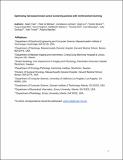| dc.contributor.author | Yala, Adam | |
| dc.contributor.author | Mikhael, Peter G | |
| dc.contributor.author | Lehman, Constance | |
| dc.contributor.author | Lin, Gigin | |
| dc.contributor.author | Strand, Fredrik | |
| dc.contributor.author | Wan, Yung-Liang | |
| dc.contributor.author | Hughes, Kevin | |
| dc.contributor.author | Satuluru, Siddharth | |
| dc.contributor.author | Kim, Thomas | |
| dc.contributor.author | Banerjee, Imon | |
| dc.contributor.author | Gichoya, Judy | |
| dc.contributor.author | Trivedi, Hari | |
| dc.contributor.author | Barzilay, Regina | |
| dc.date.accessioned | 2022-05-25T18:40:35Z | |
| dc.date.available | 2022-05-25T18:40:35Z | |
| dc.date.issued | 2022-01 | |
| dc.identifier.uri | https://hdl.handle.net/1721.1/142737 | |
| dc.description.abstract | Screening programs must balance the benefit of early detection with the cost of overscreening. Here, we introduce a novel reinforcement learning-based framework for personalized screening, Tempo, and demonstrate its efficacy in the context of breast cancer. We trained our risk-based screening policies on a large screening mammography dataset from Massachusetts General Hospital (MGH; USA) and validated this dataset in held-out patients from MGH and external datasets from Emory University (Emory; USA), Karolinska Institute (Karolinska; Sweden) and Chang Gung Memorial Hospital (CGMH; Taiwan). Across all test sets, we find that the Tempo policy combined with an image-based artificial intelligence (AI) risk model is significantly more efficient than current regimens used in clinical practice in terms of simulated early detection per screen frequency. Moreover, we show that the same Tempo policy can be easily adapted to a wide range of possible screening preferences, allowing clinicians to select their desired trade-off between early detection and screening costs without training new policies. Finally, we demonstrate that Tempo policies based on AI-based risk models outperform Tempo policies based on less accurate clinical risk models. Altogether, our results show that pairing AI-based risk models with agile AI-designed screening policies has the potential to improve screening programs by advancing early detection while reducing overscreening. | en_US |
| dc.language.iso | en | |
| dc.publisher | Springer Science and Business Media LLC | en_US |
| dc.relation.isversionof | 10.1038/s41591-021-01599-w | en_US |
| dc.rights | Creative Commons Attribution-NonCommercial-ShareAlike 4.0 International | en_US |
| dc.rights.uri | https://creativecommons.org/licenses/by-nc-sa/4.0/ | en_US |
| dc.source | Other Repository | en_US |
| dc.title | Optimizing risk-based breast cancer screening policies with reinforcement learning | en_US |
| dc.type | Article | en_US |
| dc.identifier.citation | Yala, Adam, Mikhael, Peter G, Lehman, Constance, Lin, Gigin, Strand, Fredrik et al. 2022. "Optimizing risk-based breast cancer screening policies with reinforcement learning." Nature Medicine, 28 (1). | |
| dc.contributor.department | Massachusetts Institute of Technology. Department of Electrical Engineering and Computer Science | |
| dc.relation.journal | Nature Medicine | en_US |
| dc.eprint.version | Author's final manuscript | en_US |
| dc.type.uri | http://purl.org/eprint/type/JournalArticle | en_US |
| eprint.status | http://purl.org/eprint/status/PeerReviewed | en_US |
| dc.date.updated | 2022-05-25T18:19:39Z | |
| dspace.orderedauthors | Yala, A; Mikhael, PG; Lehman, C; Lin, G; Strand, F; Wan, Y-L; Hughes, K; Satuluru, S; Kim, T; Banerjee, I; Gichoya, J; Trivedi, H; Barzilay, R | en_US |
| dspace.date.submission | 2022-05-25T18:19:42Z | |
| mit.journal.volume | 28 | en_US |
| mit.journal.issue | 1 | en_US |
| mit.license | OPEN_ACCESS_POLICY | |
| mit.metadata.status | Authority Work and Publication Information Needed | en_US |
